Why Do HIV Reservoirs Persist After Stem Cell Transplants?
By Jeffrey Laurence, M.D.
Research Question
People living with HIV have received stem cell transplants in attempts to cure co-existing leukemia or lymphoma. Three such individuals who received stem cells from donors bearing the rare CCR5-delta32 mutation have been cured of HIV, but other HIV-positive individuals who received stem cell transplants with or without the mutation were not—their virus rebounded within weeks to months after stopping antiretroviral therapy (ART). Researchers are currently investigating why stem cell transplants cure HIV in some cases, but not others.
Findings

Researchers studied 16 HIV-positive individuals on ART who underwent stem cell transplants. As usual, preparatory chemotherapy, along with the transplanted cells, killed almost all immune cells in the transplant recipient. Activated CD4+ T cells—prime targets for infection by any remaining HIV—were the first immune population to recover post-transplant. This was followed, several weeks later, by a very slow expansion of HIV-specific CD8+ “killer” T cells at low levels. These potential killers of HIV-infected cells maintained suboptimal levels for years.
Impact
The fact that a high level of activated CD4+ T cells were first to appear post-transplant, and that there was not a significant anti-HIV CD8+ T cell response, suggests that there is a “window of vulnerability” for replenishing latent HIV reservoirs in the early days following a transplant—and emphasizes maintaining ART for prolonged periods post-transplant.
amfAR’s Role
Researchers affiliated with the amfAR-funded European IciStem consortium conducted this study.
Original Article
http://www.ncbi.nlm.nih.gov/pubmed/32376772
Dr. Laurence is amfAR’s senior scientific consultant.
Share This:
